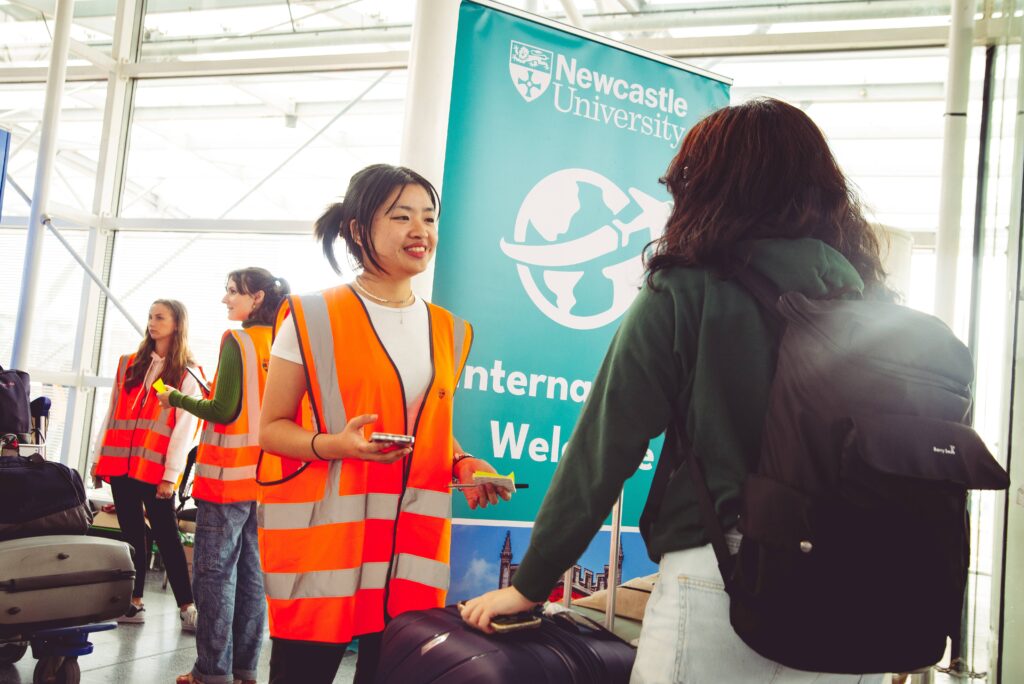We in the Sustainability Team do a lot of work alongside colleagues across the University to maintain and improve the sustainability of both our beautiful Newcastle city centre campus and our additional, specialist facilities across the North East. Another vital aspect of our university’s operations, however, are our many international connections. These ties include not only our thousands of wonderful international students, but also our overseas research and teaching communities: Newcastle University Medicine Malaysia, and Newcastle University in Singapore.
These connections and facilities generate a wealth of ideas and relationships, helping our university to achieve its aims of pioneering research and cutting-edge education. Maintaining these links and facilities also presents unique challenges in the field of sustainability, though, and so, in this blog, we’ll look at the projects, programmes, and innovations being implemented to maintain our global network sustainably.

CABie
The Climate Action Barometer for international education (CABie) is a large scale, continually rolling study being run by the International Education Sustainability Group (IESG). The study has a variety of aims and foci, but its key objectives include:
- Gathering data on higher education institutions’ approaches to climate action in their international operations,
- Contextualising and contrasting different policy approaches and practices, and
- Sharing insights, creating resources, and tracking results to help inform and drive decision-making in a community of higher education providers with international portfolios.
These objectives cover a range of operations and aspects of higher education, from student and staff engagement to assessing the emissions of international programmes and how these can be reduced through methods such as incentives and careful planning of teaching.
To learn from this collaborative exercise and contribute our own insights and work, Newcastle University have signed up to be part of the Founders’ Group for CABie in the UK. As part of this so far, we in the Sustainability Team have attended meetings to help shape the study and we have provided interviews, survey responses, and University data to add more depth to the research. The Autumn will bring the first fruits of this work, as IESG convene the group again to present the research’s findings so far and create a space for ourselves and our fellow founding universities to discuss ideas and action plans based on the data. This exciting work should provide a useful foundation of considered, data-driven proposals for reducing the environmental impacts of our international operations and we look forward to contributing to it further in future.
Singapore
The University’s operations in Singapore centre on Naval, Electrical, Chemical, and Mechanical Engineering, and our colleagues in the country have developed an impressive hub of research and teaching expertise with their work. Based across two campuses and a research institute, Newcastle University in Singapore offers a range of undergraduate and postgraduate teaching in partnership with the Singapore Institute of Technology. Additionally, our strong industrial connections in the region help to apply the research and teaching we carry out to provide practical insights across a variety of sectors.
As part of the work that’s being done in Singapore, our colleagues have maintained a strong focus on the environment in a variety of ways. Initially, specific foci on renewable infrastructure and environmental design in the Electrical and Chemical Engineering departments respectively help to catalyse progress in these areas. Meanwhile, for colleagues working in Marine technology and engineering, climate change, alternative fuels, and offshore renewable energy structures all constitute important research themes in their work. Finally, events focused on sustainability are regularly run across the departments on topics including data, entrepreneurship, and sustainability, and water security and sustainable development. These events and research themes are contributing substantially to environmental research across a variety of engineering sectors and are helping establish Newcastle University in Singapore as a leader in sustainability expertise in the region.

Malaysia
Newcastle University Medicine Malaysia (NUMed Malaysia) is a purpose-built medical school in southern Johor State. The campus offers a range of high quality undergraduate and masters programmes in medicine and biomedical sciences and has expanded and developed over more than a decade to become one of Malaysia’s leading medical education providers. As this development has taken place, NUMed Malaysia has also been working on enhancing the sustainability of its operations.
Here, the school’s Environment and Sustainability Campus Committee works hard to implement and maintain environmental projects across their beautiful, green campus and this work is supported by a range of other sustainability commitments. For instance, NUMed Malaysia was one of the first organisations to sign up to both the Global Consortium on Climate and Health Education and the British Malaysian Chamber of Commerce Climate Pledge. Additionally, the school has built on these memberships to put climate awareness at the very centre of their campus with their Eco Lounge project. The opening of the lounge was accompanied by talks given by senior colleagues on the importance of sustainability in medicine (a topic also discussed in this blog) and the space now offers students an important hub in which to relax and learn more about the climate and its impacts on Malaysia. These different projects and commitments are combining in NUMed Malaysia to help equip a new generation of doctors and nurses not only with expert medical knowledge, but also a wider awareness of medicine’s unneglectable relationship with our changing climate.
This wide variety of sustainability work being undertaken by teams across all three countries highlights our shared dedication to sustainability as part of the wider Newcastle University community. A huge thank you to the brilliant teams and interested colleagues in both Malaysia and Singapore for helping to drive this work in their own operations. If you want to find out more about how the University manages its environmental impacts here in Newcastle, you can explore our website here, or sign up to our Sustainability Network newsletter by emailing us in the team.
